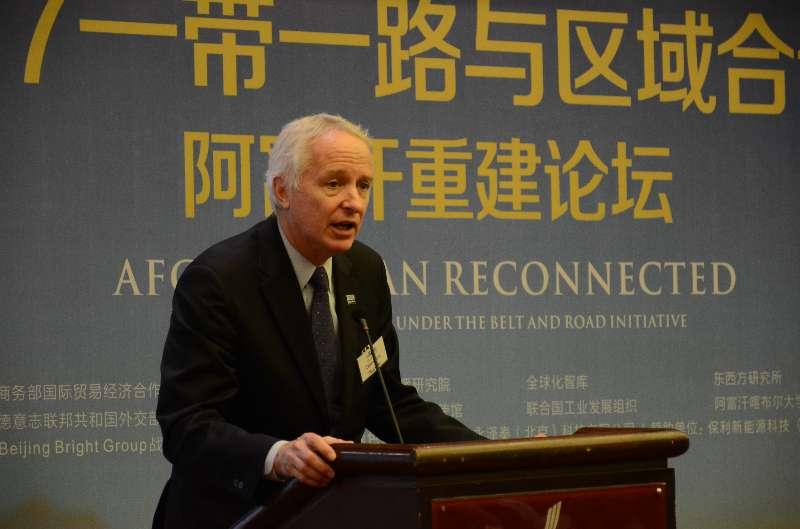
Afghanistan Reconnected: Renewed Opportunities Under China’s Belt and Road Initiative
The EastWest Institute (EWI), the National Institute of Strategic Communication at Peking University (NISC), the Centre for China & Globalization (CCG), and the Chinese Academy of International Trade and Economic Cooperation (CAITEC) convened on June 15-16 an international symposium entitled “’Afghanistan Reconnected’: Renewed Opportunities Under China’s Belt and Road Initiative (BRI)” in collaboration with the Embassy of Afghanistan to China, Kabul University and the United Nations Industrial Development Organization (UNIDO).
Following the Belt & Road Summit in Beijing in May of this year, the EWI symposium was the first follow-up event dedicated to one particular country along the “New Silk Road.” Given the tragic backdrop of the recent terror attacks in Kabul, the symposium was a timely event in reinvigorating a collective hope for the future as the general consensus was that peace in the region is dependent upon a stable and thriving Afghanistan.
The event focused on how China’s new outgoing economic strategy can provide benefits for Afghanistan's stability, security and prosperity in a regional context. To this end, it aimed to build trust between political and business contacts among countries (India, Pakistan, Iran and Afghanistan) with significant interests in the future stability of the country as well as to develop policy recommendations for regional economic cooperation.
Conceived as a Track 2 dialogue, the symposium brought together parliamentarians, diplomats, academics and professionals from across the private sector and several international organizations. Despite being an unofficial event, significant assurances from speakers associated with the National Reform and Development Commission (NDRC), the Ministry of Commerce (MOFCOM) and the Ministry of Industry and Information Technology (MIIT) represented the authentic expression of Chinese government strategy.
Key Themes
As a consequence of Afghanistan’s weakened governmental institutions and endemic corruption, the need to address the very real concerns that BRI may forgo Afghanistan completely was a main topic of concern. However, amongst Chinese reassurances that Afghanistan is very much a central cog of BRI, other delegates warned that an unstable and economically regressive Afghanistan will also hamper the future success of its neighbors.
Chief among several tangible Chinese pledges was the commitment to further financial investment and professional training. Improving and increasing the possibilities for people-to-people exchanges between all countries along the New Silk Road was also emphasized as a perquisite to BRI’s possible success. Several Chinese speakers voiced China’s commitment to provide 10,000 scholarships to train Afghan researchers, managers and engineers to run 50 jointly-organized laboratories. The mining industry, in particular, was identified as a specific area of win-win cooperation, as Afghanistan boasts rich deposits of several minerals and can benefit from the infrastructure and technical expertise of China to exploit these resources.
Along with discussions concerning trade and transit, investment and infrastructure, and energy cooperation, sustainable or “green” development was a new theme to emerge as a guiding principle of BRI. In order to ensure the New Silk Road is conscious of its environmental impact, there were calls for concerted efforts from the Chinese government and its international partners to share information in order to develop thorough regulation and policy. In addition to its abundant natural resources, Afghanistan also has masses of renewable energy potential waiting to be tapped into, such as 23,000 megawatts of hydropower which, if developed, could be exported to Pakistan. Furthermore, well over 200,000 MW of solar energy and tremendous possibilities for wind energy are yet to be realized. As a concrete outcome, cooperation between Kabul University and Poly Solar Technologies was concluded to help both the university train Afghan students and the company invest in the Afghan market.
During the discussions, participants drew attention to how BRI can both learn and expand from previous initiatives which attempted to revitalize and reestablish the centrality of the Old Silk Road in global economics. Several philosophies underpinned previous attempts, but BRI’s strength lies in its extensive research and identification of significant focus areas, including Afghanistan. A major task for BRI in this regard is to address the large trade imbalance between China and Afghanistan by creating stronger trading links through the China Pakistan Economic Corridor (CPEC).
When considering the more polarizing foreign policy emanating from Washington, a significant geopolitical observation to come out of the symposium was the prospect for BRI to be a driving force in convincing regional states to put aside their differences in order to foster a richer culture of cross border cooperation. With over 20 terrorist groups said to be operating in Afghanistan, several delegates dispelled the myth that a difference between “good” and “bad” insurgent groups exists. Delegates, therefore, expressed the hope that both the U.S. and China would use their leverage over Pakistan and Afghanistan to work towards a common understanding of combatting violent extremism, and at the same time towards connecting the two countries through the existing and new rail and road systems. EWI’s CEO Cameron Munter, former U.S. Ambassador to Pakistan, pointed out that BRI and the converging interests of the U.S. and China represent not only an immense mobilizer of unprecedented economic opportunities, but also an opportunity to strengthen institutional capacities and state building.
These arguments echoed Afghan President Ghani’s sentiments just a week prior, while he was in Astana, Kazahkstan as part of the latest Shanghai Cooperation Organization (SCO) summit, where he expressed his willingness to step up cooperation in transportation to enhance connectivity. Chinese influence is seen as a potential driver for brokering bilateral agreements regarding border management control along the hotly contested, and often tense, Durand Line. A common complaint, reiterated several times throughout the symposium, was that despite hundreds of agreements and MoU’s in place between Afghanistan and its neighbors, these policies often go unimplemented. In terms of the border between Afghanistan and Pakistan, Chinese/U.S. influence was envisioned as serving the dual purpose of providing an independent check on illegal crossings and assisting with trade management processes for trucks transiting goods in and out of either country.
Contrary to more pessimistic reports amongst geopolitical and international relations analysts, and with respects to other local infrastructure projects in the region, delegates at the event highlighted the potential synergies between the Iranian Chabahar and Pakistani Gwadar ports. Some see the construction of the two ports as physical manifestations of the wider geopolitical tensions in the region, especially considering the former is largely viewed as an avenue by which India and Afghanistan can increase trade by circumventing Pakistan. Yet, it was the compatibility of the two ports which garnered most discussion at the symposium with comments that Gwadar could complement the overall function of Chabahar by handling any spillover cargo. Moreover, the short distance between the two ports was seen as the ideal reason to implement a feeder vessel service, transporting both cargo and people to greatly enhance the economy and build trust between Iran, Pakistan and Afghanistan.
All parties to the symposium were thus unanimous in their insistence that Afghanistan will be an indispensable building block in the realization of BRI as it shall provide the bridge between east and west. More importantly, all delegates agreed BRI offered a unique chance for the countries of the region to focus on their mutual interests, rather than their mutual differences, in pursuit of economic prosperity and peace. As one delegate put it succinctly, this is a chance the region must not pass up.



